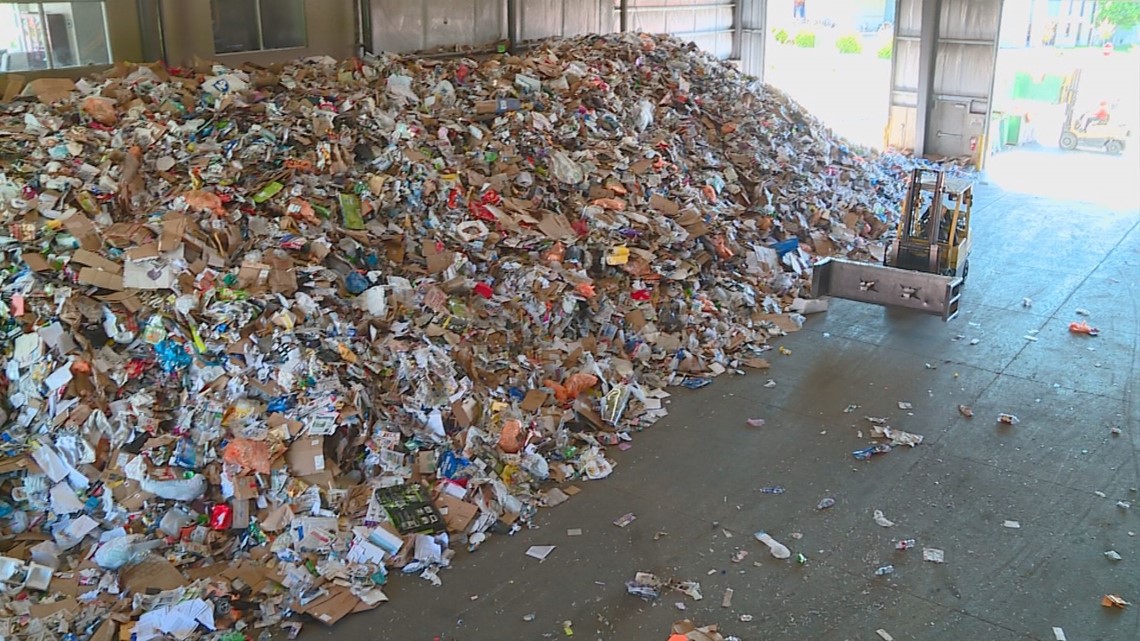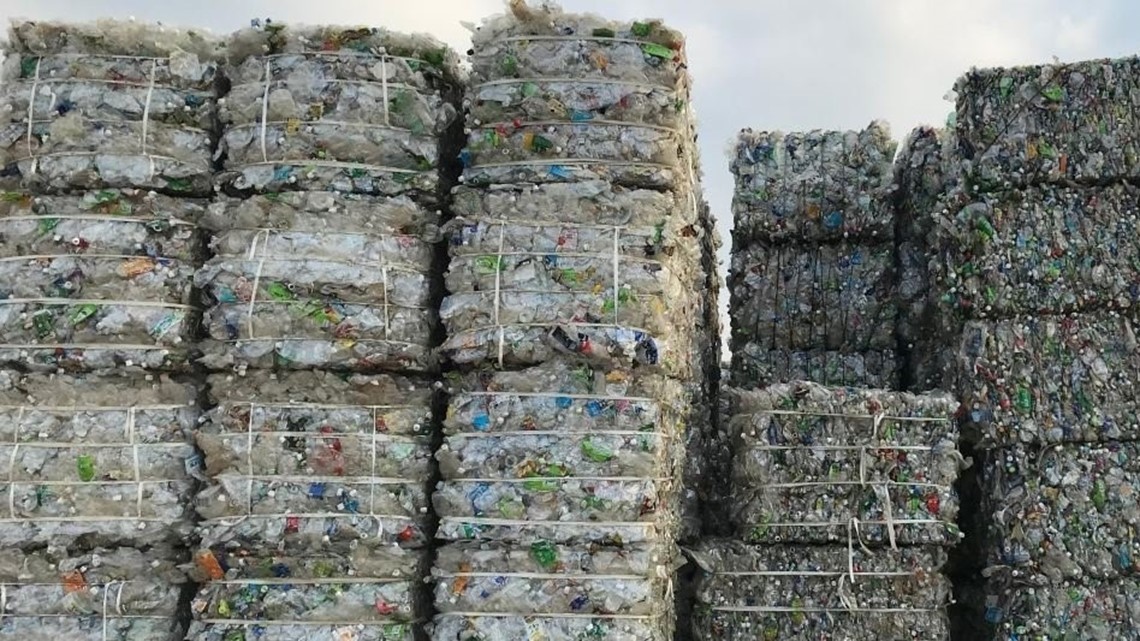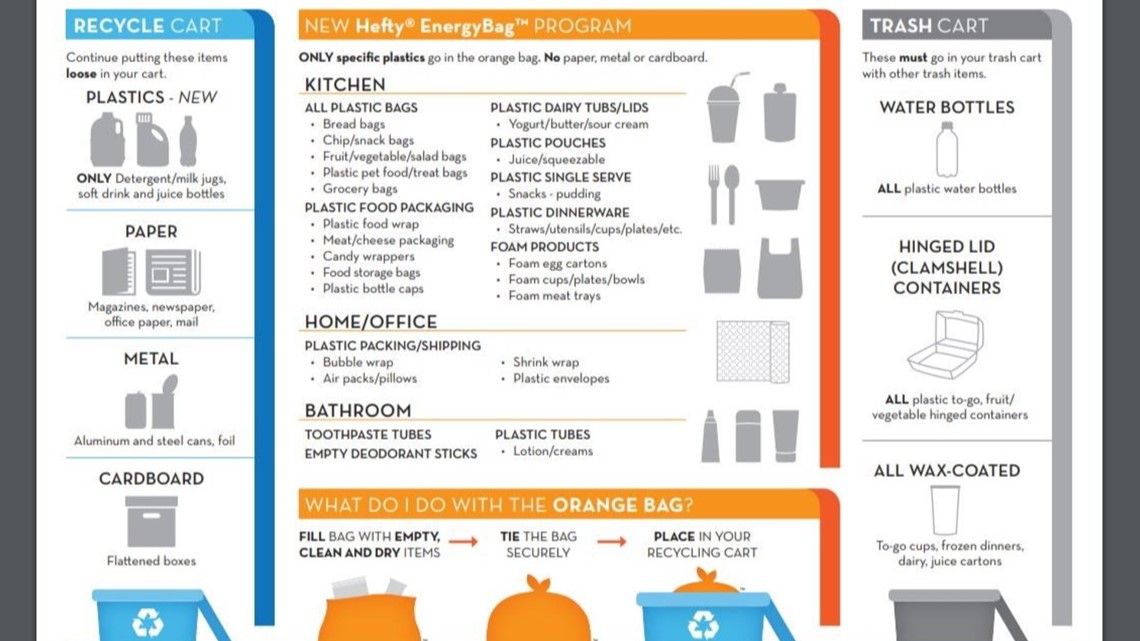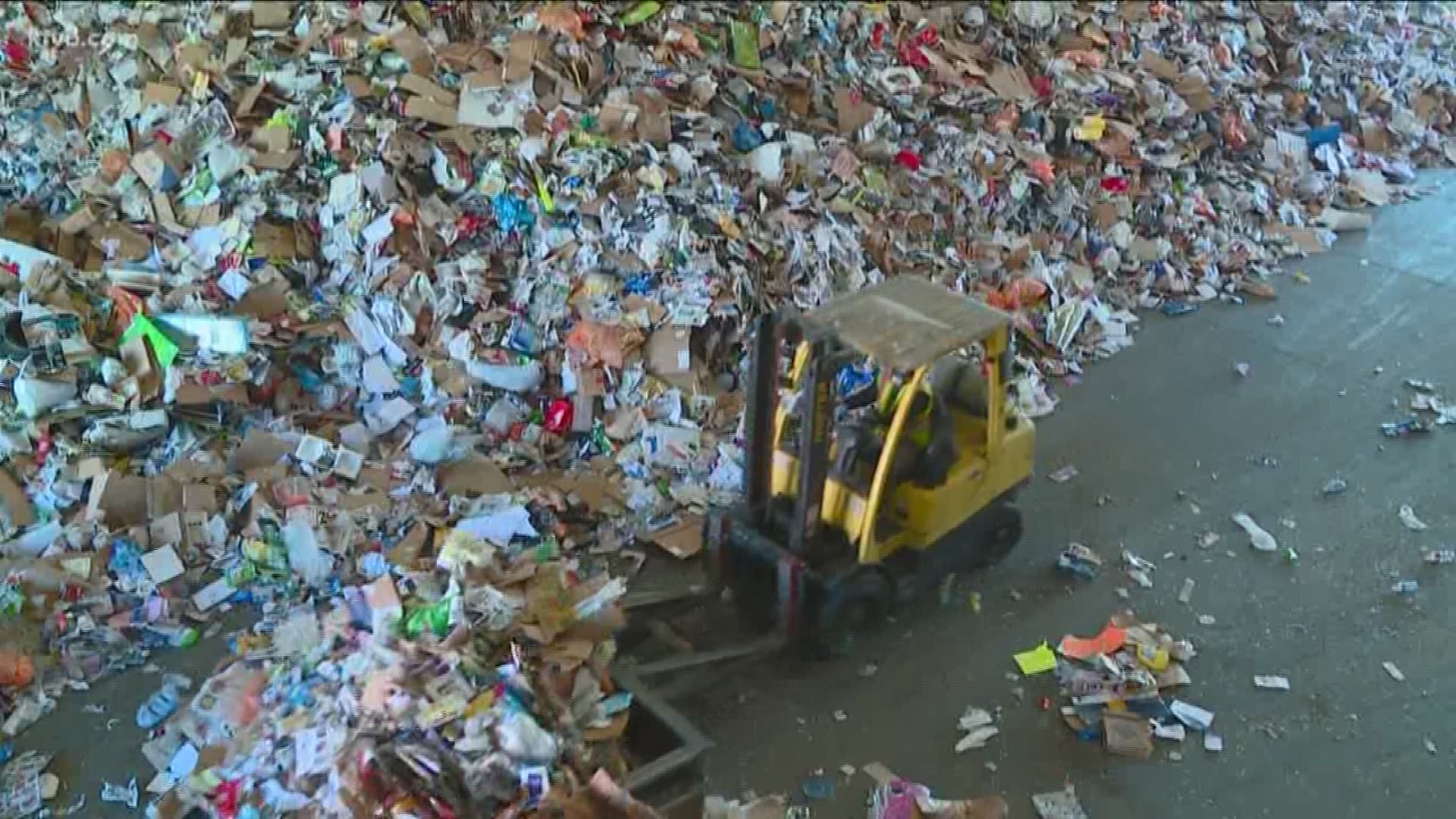BOISE, Idaho — If you've ever found yourself standing in front of your trash and recycling bins, but could not decide whether that piece of household waste was recyclable or not, you are not alone.
The situation became even more complicated with the addition of the Hefty EnergyBag program in certain Treasure Valley cities.
While you can now recycle more items that previously would have gone in the trash - particularly plastics - it can be confusing and often frustrating trying to figure out which receptacle to put your recyclables.
Certain types of plastics can be placed directly in the recycling bin, while others must go in the orange Hefty bags. Still others cannot be recycled at all and must be thrown out.
The reason for these very specific recycling rules has to do with contamination.
Colin Hickman with Boise Public Works says workers at the city's recycling facility must sort through - by hand - about 150 tons of materials each day.
According to Hickman, the majority of the workers' time is spent on sorting things that should not be sent to the recycling facility in the first place. The biggest contaminant by far is plastic film - grocery bags, garbage bags, saran wrap, and bubble wrap.
Roughly 400 tons of contamination, mostly plastic film, is painstakingly picked out by hand and sent to the landfill every month. If it was disposed of properly - in the orange Hefty bags - all of that plastic film could have been converted into fuel.


Officials say if you aren't sure whether something should be recycled, just throw it in the trash.
If you're having trouble figuring out what goes where, this guide is here to help you make sense of it all. (Scroll down to see specific recycling information for communities taking part in the Hefty EnergyBag program and those that are not participating in the program.)
HOW DID WE GET HERE?
Up until 2018, China took a large share of recyclable materials from the United States and other western nations. But last year, the country passed a ban to limit the types of recyclables that can be imported. This created a recycling crisis for much of the world, but also forced local governments to examine their own recycling options.
Boise city leaders acknowledged that they had to make some hard decisions in a very short time frame.
In an effort to avoid sending non-biodegradable plastics to landfills, Boise and several other cities in Ada County joined the Hefty EnergyBag Program, in which certain types of plastic are collected locally and transported to Salt Lake City, where a company called Rewewlogy converts the plastics into synthetic diesel fuel for off-road use.
Boise public works officials say the city was the first in the nation to implement a citywide roll-out of the program, which has - as of spring 2019 - collected more than 250,000 pounds of plastic to be sent to Renewlogy.


SANITATION SERVICES
Several different sanitation companies operate in the Treasure Valley and offer different options when it comes to recycling. The largest is Republic Services, which provides residential trash and recycling pickup for the largest cities in the valley - including Boise, Meridian, Nampa and Caldwell.
Other sanitation companies operating in the Treasure Valley include Hardin Sanitation, which services the western end of the valley including Payette County and parts of Canyon and Washington counties; J&M Sanitation which operates in the Kuna and Melba areas; and Ontario Sanitary Service in Malheur County.
Republic Services offers the Hefty EnergyBag program, although not all cities or counties participate. Generally speaking, cities and unincorporated areas in Ada County have the option to recycle using the bright orange EnergyBags, while cities and unincorporated areas in Canyon County do not.
You can find out more about the recycling options provided by local sanitation service at the following links:
Participating in Hefty EnergyBag Program:
- Ada County (Note: Ada County recently awarded its contract for waste collection to Hardin Sanitation, so recycling options may change in the near future.)
- Boise (You can also learn more about Boise's trash, compost and recycling options on the city's Curb It website)
- Eagle
- Garden City
- Meridian
- Star
Not participating in Hefty EnergyBag program:
Hardin Sanitation
J&M Sanitation
Ontario Sanitary Service
PSI Environmental Systems
GLASS RECYCLING
In Boise, residents can drop glass recyclables of at one of 12 drop sites or leave it out at the curb after paying a monthly fee.
Colin Hickman with Boise Public Works says the glass recycling program is quite popular among residents. The city collects around 250 tons of glass each month.
"Once that glass is taken from homes throughout the city it is brought to a facility here in Boise where it's crushed, broken down and then that company uses it for industrial processes similar to sandblasting," Hickman said, "The city is really fortunate to have a local partner here."
COMPOST
Several communities throughout the Treasure Valley also offer options for composting yard and biodegradable food waste. In Boise, for example, you can use a Republic Services-provided bin with a green lid to dispose of lawn clippings and other approved waste items. Find out more on the Curb It Boise website, or check with your local sanitation service (see links above).
HEFTY ENERGYBAG PROGRAM: WHAT GOES WHERE?
Print off a recycling home reference guide (pdf), a detailed guide, or black and white version of the detailed guide.
Cities and counties taking part in the Hefty EnergyBag Program still have just one recycling bin, but instead of putting all recyclables into the bin individually, certain plastics must be separated and placed into special orange Hefty bags. The bags can be purchased at Albertsons stores and may be provided free of charge by your city.
Items placed in Hefty bags should be clean and dry. Once the bag is full, tie the bag securely and place it in your recycle cart with other loose items.
Loose in Recycle Cart:
- Plastics - Anything marked with a #1 or #2 recycle symbols, or shaped like a bottle, jug or jar (eg. milk jugs, 2-liter soft drink bottles, detergent jugs, mayonnaise jars, peanut butter jars, etc.) Note - all lightweight (crinkly) water bottles must go in the trash.
- Paper - Magazines, newspapers, office paper, mail
- Cardboard - Flattened boxes
- Metal - Aluminum and steel cans, foil
Hefty EnergyBag (placed in Recycle Cart once bag is full):
- Anything marked with the #4, #5, #6, or #7 recycle symbols should go in the Hefty bag, as well as anything on the list below:
Kitchen items:
- Plastic bags
- Plastic bottle caps
- Plastic dinnerware
- Plastic food packaging
- Plastic lids
- Plastic single-serve cups
- Plastic squeeze pouches
- Plastic straws
- Foam products
Office/bathroom items:
- Bubble/shrink wrap
- Air packs/pillows
- Plastic envelopes
- Toothpaste/lotion tubes
- Empty deodorant sticks
- Amber-colored prescription bottles
For a more detailed list of recyclable items, click here.
Trash Cart
Certain plastic items cannot be recycled and must go in the trash. This includes:
- Lightweight (crinkly) plastic water bottles
- All hinged lid (clamshell) containers
- Wax-coated boxes and containers, including to-go cups, frozen dinners and juice cartons
- Any unlabeled plastic that is not identified on the EnergyBag list
- Bonded materials - for example, a pet food bag with a paper liner
- PVC or #3 vinyl - shower curtains, PVC pipes, garden hoses, inflatable items, kids toys


COMMUNITIES NOT PARTICIPATING IN HEFTY ENERGYBAG PROGRAM
Communities that are serviced by Republic Services (find a list here) but not participating in the EnergyBag Program are limited on the types of plastic materials that can be recycled (items marked with #1 or #2 recycling symbol only).
RECYCLABLE ITEMS
Plastics
- Bottles and jugs marked with #1 or #2 recycle symbol
Paper and Cardboard
- Cardboard boxes (broken down to fit in cart)
- Frozen food & cereal boxes (no liners)
- Construction paper
- Envelopes (cellophane window ok)
- Office waste paper (any color)
- Magazines and catalogs
- Computer and fax paper
- Phone books
- Newspapers
- Paper bags
- Junk mail
Cans
- Aluminum, steel, tin, and aerosol cans
- Items must be empty, clean and dry before placing in recycle cart
DO NOT RECYCLE (GOES IN TRASH)
- Lightweight water bottles
- Clamshell containers
- Plastic bags or other soft plastics
- Styrofoam packaging
- Chip and candy wrappers
- Hazardous waste containers
- Food contaminated paper (pizza boxes, plates, coffee cups)
- Wax coated cardboard
- Milk and juice paper cartons
- Tissues, napkins, paper towels
'When in doubt, throw it out'
As a general rule, recycling officials say "when in doubt, throw it out." This is because items not approved for recycling can contaminate other recyclable items and can slow down the sorting process at the recycling plant.

